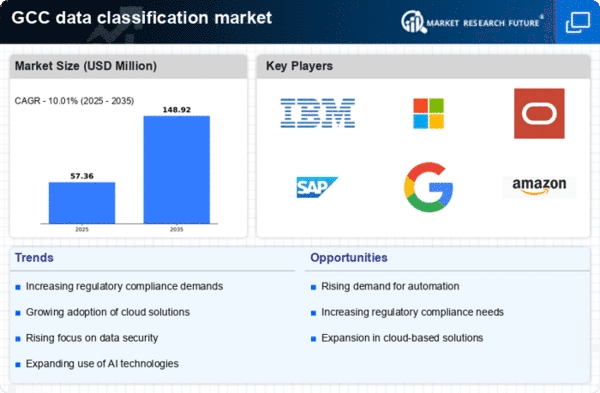Increased Focus on Data Privacy
The data classification market is being propelled by an increased focus on data privacy regulations in the GCC. As governments and regulatory bodies implement stricter data protection laws, organizations are compelled to adopt comprehensive data classification strategies to comply with these regulations. This heightened emphasis on privacy is driving businesses to invest in solutions that enable them to classify and manage personal data effectively. Recent legislative developments indicate that data privacy regulations in the GCC are becoming more stringent, with potential fines for non-compliance reaching up to €20 million or 4% of annual global turnover. This regulatory landscape suggests that organizations are prioritizing data classification as a means to safeguard personal information and mitigate legal risks, thereby fostering growth in the data classification market.
Escalating Cybersecurity Threats
The data classification market is significantly influenced by the escalating threats posed by cyberattacks in the GCC region. As organizations increasingly digitize their operations, the risk of data breaches and unauthorized access to sensitive information has intensified. This environment has led to a heightened focus on data classification as a critical component of cybersecurity strategies. By categorizing data based on sensitivity and importance, organizations can implement targeted security measures to protect their most valuable assets. Recent reports indicate that cybersecurity spending in the GCC is expected to reach $30 billion by 2026, underscoring the urgency for effective data classification solutions. This trend suggests that businesses are prioritizing investments in technologies that enhance their ability to classify and secure data, thereby driving growth in the data classification market.
Adoption of Cloud-Based Solutions
The shift towards cloud-based solutions is reshaping the data classification market in the GCC. As organizations migrate their operations to the cloud, the need for effective data classification becomes paramount to ensure data security and compliance. Cloud environments often host vast amounts of sensitive data, necessitating robust classification mechanisms to manage access and protect against potential breaches. The cloud services market in the GCC is projected to grow at a CAGR of 20% over the next few years, which is likely to drive demand for data classification tools that can seamlessly integrate with cloud platforms. This trend indicates that businesses are increasingly seeking solutions that not only classify data but also provide visibility and control over data stored in the cloud, thereby enhancing their overall data management strategies.
Rising Demand for Data Governance
The data classification market is experiencing a notable surge in demand for robust data governance frameworks across various sectors in the GCC. Organizations are increasingly recognizing the necessity of implementing structured data management practices to ensure compliance with local regulations and enhance operational efficiency. This trend is driven by the need to protect sensitive information and maintain data integrity. According to recent estimates, the data governance market in the GCC is projected to grow at a CAGR of approximately 15% over the next five years. This growth is likely to propel the data classification market, as effective governance relies heavily on accurate data classification to facilitate data discovery and access control. Consequently, businesses are investing in advanced data classification solutions to streamline their governance processes and mitigate risks associated with data mismanagement.
Growing Importance of Data Analytics
The increasing reliance on data analytics is a significant driver for the data classification market in the GCC. Organizations are leveraging data analytics to derive insights and make informed decisions, which necessitates the effective classification of data to ensure accuracy and relevance. As businesses strive to harness the power of big data, the need for precise data classification becomes evident. This trend is reflected in the growing investments in analytics tools, with the GCC analytics market expected to reach $10 billion by 2025. Consequently, the data classification market is likely to benefit from this trend, as organizations require sophisticated classification solutions to facilitate data analysis and ensure that the right data is available for decision-making processes. This interplay between data analytics and classification underscores the evolving landscape of data management in the region.

















